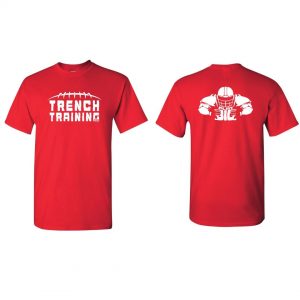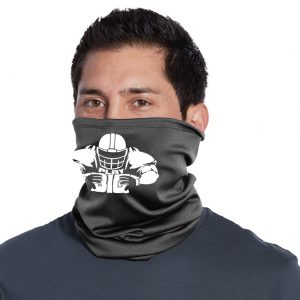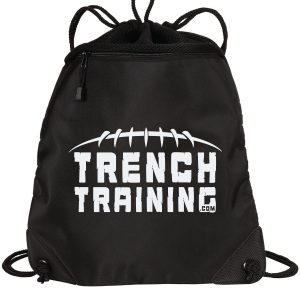
by Steve Stark | Aug 14, 2016 | coaching kids, youth football
If you are around sports long enough you get to meet many different types of coaches.
Some good, some bad, some crazy. Some that make us crazy.
Before we get into discussing the types of coaches that drive us crazy I want to say that I admire every coach.
Being a coach is a very special job.
It’s not always an easy job and it’s not for everyone.
But anyone who really tries and has the kids best interest at heart should be applauded.
No matter how “good” of a coach they are.
In today’s video, I discuss a few types of coaches that are difficult to deal with and some tips to make the best of each situation.
[video_player type=”embed” width=”560″ height=”315″ align=”center” margin_top=”0″ margin_bottom=”20″] [/video_player]
[/video_player]
[hyperlink style=”1″ href=”http%3A%2F%2Ftrenchtraining.com%2F” font_size=”23″ font_color=”%231414ad” align=”center”]Get Your FREE Membership to Exclusive Content at TrenchTraining.com[/hyperlink]
5 Types of Coaches that Make Us Crazy
Screaming Steve
We’ve all had a yeller for a coach. Screaming Steve has to hear his voice over everyone and everything.
In fact, you probably wonder if Steve is trying to be heard 3 towns over.
First off, not all coaches that yell are bad. Some of the best coaches I have had were loud and obnoxious at times.
The reason they were good, however, was that they were instructing not just yelling.
Screaming Steve yells things like “BLOCK!”, “TACKLE!”, or “PLAY BETTER!’
That’s not coaching. Those things don’t make anyone better.
A coach instructs a player on how to block, how to tackle and how to play better.
They don’t just yell.
How to deal with Screaming Steve:
I once got a great piece of advice about yelling coaches.
Most coaches yell because they care and they are trying to make you better.
If they stop yelling… that is when you worry.
Try to explain to your athlete that yelling doesn’t mean a coach doesn’t like you.
It’s often that they just want to make you a better player.
Negative Ned
Praise loudly, criticize softly.
That’s the best coaching advice I have ever been given.
Humans respond better to praise than criticism. Period.
Yet there are many coaches who focus on telling players what they are doing wrong.
Of all the types of coaches, Negative Ned is the most difficult for me to accept.
Now you might say, “Well isn’t that what a coach is supposed to do?’
Not really. A coaches job is to teach.
Again, what we are talking about here is the style of the coach.
Leading with criticism automatically puts a player, especially a young player, on the defensive.
Negativity will always breed this reaction.
Even if the coach teaches the proper technique incredibly well, if they led with negativity all time, the player will not absorb the teaching as well as if they had led with positivity.
“Well it can’t all be rainbows and sunshine, right?”
Maybe not. But If a coach leads with a positive comment they will get better results.
Let’s look at two different scenarios…
Negative Ned stops the drive blocking drill by yelling, “Stark! Are you kidding me? That was a terrible block! You have to get your helmet across on this play. Do your job!”
What’s wrong with the statement by Ned?
First, the sarcasm with “Are you kidding me?” is worthless. It serves no purpose other than to belittle the player.
Second, after your athlete hears “That was a terrible block.” They are going to tune out the rest.
Your athlete gets defensive and shuts down.
Here’s the second scenario from another coach named Positive Pat.
Positive Pat stops the drive block drill and says. “Stark! Great job with your feet and I really like how you used your hands there. The only thing I want you to do better on this play is to get your head across. That’s going to get your head in the hole and help you sustain your block.”
Pat reinforces what the player did right in the drill and then made a correction and told him how he could do it better next time.
Another key point here is to explain WHY the player needs to make the correction.
Can you see the difference here? It’s night and day. Great job Pat!
How to deal with Negative Ned:
Tell your athlete to focus on the instruction.
The negative comments are often that coaches way of trying to get a players attention.
As an athlete, you have to build up a thick skin because there will always be negativity.
Unfortunately, negativity is everywhere and not just in sports.
Loophole Larry
There’s always that guy that know ever by-law of every rule set out in the rec league handbook.
And Loophole Larry enforces then every chance he gets.
Even if it means holding up a game to argue with a referee and look the rules up.
(Larry keeps a copy of the league handbook in his back pocket at all times. He probably sleeps with it.)
Larry is very much concerned with the 5th-grade league championship.
He plays all the kids, but the best players play 90% of the time.
Don’t be Larry.
How to deal with Loophole Larry:
This is a great time to teach your athlete the importance of patience.
Patience is the key.
The problem with Larry is that he is often correct about the rules.
Especially the more odd and obscure ones.
Know-It-All Norman
Norman was an Honorable Mention All-Region defensive tackle back in the day.
He knows the game inside and out… just ask him.
His way is the ONLY way that is acceptable.
Norman is very defensive about his coaching and thinks all the parents are idiots.
Even the ones that had a cup of coffee in the NFL.
Mr. Know-It-All also generally fits into one the first two types of coaches with Screaming Steve and Negative Ned.
How to deal with Know-It-All Norman:
Offer to help with the team.
Even if it’s just occasionally helping with a drill.
Know-It-All Normans tend to tone it down when there are other confident adults in the vicinity.
Casual Carl
Carl’s a real laid back dude.
He’s never really played any sports but he wanted to volunteer for his kid. (Which is great by the way.)
But Carl just lets the kids kind of coach themselves.
Freedom and having fun are all Carl is about.
Now, kids should have fun when they play any sport but a coach must also maintain control of a team.
Too much freedom and flexibility can lead to unmotivated players.
That’s when the team goes sideways and that’s never good.
How to deal with Casual Carl:
This is another opportunity to step in and help.
Offer to organize team activities.
Adding a little structure to the team may be enough to keep it from becoming a free-for-all.
The Best Coach I Ever Had
In college, I definitely had a Screaming Steve for a coach.
At first, I was terrified of him.
This coach was so intense that there were times I didn’t think I was going to make it at college.
Eventually, I figured out that it was just his style of coaching.
He was mad at the players.
He just used yelling as his way to teach.
The thing that really made me realize this was his attention to detail.
He was the most technically demanding coach I have ever met.
That paid off for me as I was not always the biggest or strongest guy on the line.
However, I was a great technician of the game and my coach made me that way.
There are many types of coaching styles.
We certainly can’t list them all here.
Did you ever experience a difficult coach as a player or parent of a player?
Have you experienced any of these types of coaches?How did you handle it?
How did you handle it?
We’d love to hear your comments.
I hope you found some value with today’s post.
If you did please like, comment and share.
Play Big!

Coach Steve
Photo credits:
Marianne O’Leary – Edited

by Steve Stark | Aug 8, 2016 | training
The start of football practice brings so many exciting things.
Getting your helmet & pads, putting on your practice jersey for the first time, seeing all your friends that you haven’t seen much over the summer, meeting new coaches…
There’s also the not so exciting things like gassers, cross fields, sprint ladders, sit-ups, pushups, and the dreaded muscle soreness.
Sometimes it can be difficult to tell if you child has muscle soreness or if they have an injury.
In today’s post, we are going to discuss the difference between being sore and being injured/hurt.
[video_player type=”embed” width=”560″ height=”315″ align=”center” margin_top=”0″ margin_bottom=”20″] [/video_player]
[/video_player]
Have you ever heard someone say that they are getting in “football shape”?
What does it mean to be in football shape?
No matter how fit a player is heading into a football season it’s not the same as football practice and games.
A football player uses muscles every day in practice in a way that they are not simulating in training.
That alone will create a lot of muscle soreness in that first week of practice.
Just about the time a player starts to feel better… we add pads.
Wearing pads and participating in contact drills adds a whole other level of soreness.
This is VERY normal.
What is difficult to tell, at times, is the difference between being sore and being hurt or injured.
Let’s be clear we are NOT doctors and we didn’t stay at a Holiday Inn last night, but we have a little experience with soreness and injury.
Here are 4 questions to help you determine what’s happening with your athlete.
4 Questions to Distinguish Muscle Soreness from Pain
How does your athlete describe the pain?
Is it a dull ache when they move?
More times than not this is muscle soreness.
If the pain is sharp or acute then that could be the sign of an injury.
Body language tells a lot.
When you first put the pads on for fall football camp it feels like you got hit by a dump truck.
This is completely normal.
Sharp or acute pain is not normal and that’s the number one thing you want to listen for from your athlete.
Where on the body is the pain?
Is the pain is in the joint or in the muscle?
If the pain is in the joint then you should definitely be concerned that there may be some form of injury.
Soreness will mostly occur in the muscle however muscles can certainly sustain injury as well.
Joint pain is often a sign of a strain or a tear in a ligament.
Be sure to get that looked at immediately.
How long does the pain persist?
Muscle soreness doesn’t generally last more than 2-3 days.
That said… your athlete will likely be sore after the first day of practice and then again after the first day of practice in pads.
Those are a given every year.here are just days when your athlete does something new
There are also just days when your athlete does something new that have not done before.
Any time you use muscles in a different way you are like to get sore.
Scrimmages and games are also going to cause some soreness.
Because games move at a different speed, athletes push their muscles past normal limits.
Some of the worst days of muscle pain for me were the day after games.
I remember those days in some cases more than playing in the games.
All of these times when an athlete gets sore lasts only a day or two.
A good guideline to consider for your athlete is if the pain that persists for more than a week, then get it checked out by a doctor.
Is there pain at rest? Without moving.
With muscle soreness, there usually isn’t a lot of pain when you’re not moving.
Muscle soreness gets better after you are up and moving and warm the muscles up.
If you are getting pain without moving then you likely have an injury.
That is a sign of inflammation.
Inflammation is the body’s response to injury.
Here’s a good explanation from SportsInjuryClinic.net…
[feature_box style=”16″ title=”Inflammation” alignment=”center”]
When the body is injured a sequence of events is initiated that leads to the eventual repair of the injury site. The first stage in this process is inflammation which is followed by tissue healing and repair.
[/feature_box]
Check out the full article at SportsInjuryClinic.net.
Most often, you’ll notice swelling with a muscle strain or joint injury.
However, an athlete can have inflammation without obvious swelling.
Again, if your athlete is having pain without moving, get it checked out.
Muscle Soreness Recovery Tips
1. Get more sleep.
Sleep is when the body makes it’s repairs.
The body takes protein and repairs muscles.
Depriving the body of sleep will decrease it’s repair time.
Get sleep!
2. Stay hydrated.
Water is an essential ingredient to repairing the body.
It lubricates the joints and helps with blood flow.
Not only does hydration help during activity it’s ultra-important for repair.
Therefore, be sure your athlete is drinking water thorughout the day and not just at practice.
3. Eat more protein.
Protein is another essential ingredient for repairing the body.
Not only is protein needed to properly fuel the body, it’s a must for repair.
Athletes require more protein because they are constantly using it for fuel and repair.
Start your day with high protein meal and try to get a light protein snack in before going to sleep.
4. Drink chocolate milk.
Chocolate milk is a great post-workout snack.
The protein combined with the carbohydrates in chocolate milk make it a perfect way to get your body’s repairs kickstarted.
5. Foam roller.
Using a foam roller on a daily basis can have a huge impact on muscle soreness.
Most soreness from exercise is related to knotting in the fascia.
The fascia is connective tissue that runs throughout the body over the muscles.
Knots (also called hotspots) form in the fascia with normal damage from exercise.
Using a semi-rigid foam roller to knead out the hotspots will do wonders to alleviate muscle soreness.
6. Cold bath.
Ice baths, while not pleasant, have been shown to be very effective.
A full-body plunge after a heavy workout can help reduce muscle soreness and inflammation for up to 24 hours.
There are a lot of other home remedies out there for soreness.
Every athlete is different and has different needs when it comes to recovery.
Be sure to listen to your athlete and find out what they need.
Maintaining a healthy body is the key to success in any sport.
I hope you found some value with today’s post.
If you did please like, comment and share.
Play Big!

Coach Steve
Photo credits:
Ron Cogswell – altered
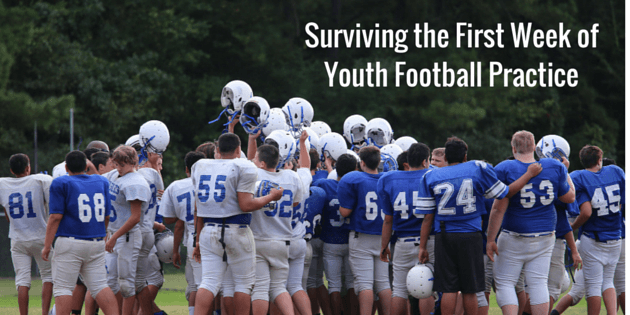
by Steve Stark | Jul 25, 2016 | youth football
The first week of youth football practice is almost here!
This is one of most exciting weeks of the year.
It’s also one the scariest and most difficult weeks of the year for players at all levels.
I know I felt that excited, nervous feeling every single year I started a football season.
As I got older there were a few questions that I would always ask myself.
Am I in good enough shape?
Where do I fit in on this team?
Will I be good enough to play?
How hard is this first couple of weeks going to be?
Will I make it?
That anxiety mixed with excitement is something that makes football very special.
I never felt like that with any other organized sport that I played.
As a first year player, at ever level, there is also a sense of fear.
Fear of the unknown.
It’s a fear that can be overcome.only going through a tough couple weeks of practice with your teammates can be overcome
Overcome, only by going through a tough couple weeks of practice with your teammates.
Those experiences will force your athlete to form a bond with his teammates that will last a lifetime.
Again, that is what is so special about football.
So what can you do as a parent to help your athlete get through that first week of youth football practice?
Make football the best experience possible for your child.
Here are some tips to help your athlete survive that first week.
[video_player type=”embed” width=”640″ height=”360″ align=”center” margin_top=”0″ margin_bottom=”20″] [/video_player]
[/video_player]
5 Tips to Survive the First Week of Youth Football Practice
1. Stay hydrated and eat well.
Water, water, water!
Late July and early August is hot all over the U.S.
Your athlete needs to drink lots of water to stay hydrated.
Eating healthy is also important.
Don’t let your kid sit around and eat junk food all day.
There’s nothing worse than having a belly ache in 90-degree weather while you’re working out.
2. Get rest.
Football is a physically challenging sport.
Regardless of how fit your athlete is at the beginning of the football season, their bodies will be sore and tired.
They need good rest.
Be sure that your athlete is getting a solid 8 hours of sleep minimum every night.
It may still be summer, but staying up late to play video games and watch tv will not help your athlete recover.
The best remedy for sore, tired muscles is rest.
Also, try to get your athlete in a pool if you have access.
This is also great for recovery.
Just don’t let them go nuts for hours and defeat the purpose of pool time for recovery.
3. Wear comfortable clothes.
The one thing I did every year I played in college was to break my cleats in.
It doesn’t take much.
Just get a few workouts in with your cleats on.
Have your athlete get together with some friends and play touch football or even wiffleball while wearing their cleats.
Make sure your athlete is comfortable with their clothes too.
Showing up to practice in jean shorts is not comfortable.
Get some athletic clothes.
If you’re not sure what your athlete needs then ask the coaches.
You don’t have to break the bank with Nike and Under Armour gear but you need to get them comfortable clothes.
4. Let the coaches coach.
Trust that the coaches for your child’s team know what they are doing.
And remember… almost all of them are volunteers.
Don’t be barking at people who are willing to work with your kids for nothing.
Especially when you are not.
Every youth program welcomes help.
If you feel like you can contribute to the program let those in charge know and see if there is a need you can fill.
As a dad myself, I know first hand it can be difficult to coach your own child.
Keep this in mind as you volunteer to coach.
Whatever you do, don’t be an armchair quarterback for 6th-grade youth football practice.
Nobody likes that parent.
Nobody.
5. Don’t let them quit.
I live by the saying, “If it were easy, everyone would be doing it.”
Football is hard.
It’s not for everybody but your child won’t know that if they quit after the first day.
The first day your child practices in pads will probably be the most difficult day of football in their entire lives.
This is when parents most often get the, “I want to quit. Football is too hard.”
Don’t let your child quit because it’s too hard.
Hard is what makes it worthwhile.
Hard is what makes it fun.
Hard is what teaches life lessons that your child will carry with them for the rest of their lives.
I recently wrote a post about how I Almost Quit Football.
It is my belief (which I learned from my dad), that when you start something you finish it.
You never quit because it’s too hard.
99% of kids who say they want to quit after that first day, if they stick it out for a week, will love football forever.
You as a parent have to be strong enough to help them realize that.
If after that first week they hate it, go talk to the coach.
Make sure nothing else is going on.
If there isn’t any other reason and your child just doesn’t like it, then make a decision.
Just make sure this is not a lesson that your child misses because YOU are not strong enough to help teach it.
This really is one the greatest couple of weeks of the year.
Some of the things I remember…
…the smell of the cut grass, the nervous feeling leading up to practice each day, the laughs I had with my friends, the difficulty of conditioning and how much I hated it, and the elation of finishing a practice each day.
What do you remember from youth football practice?
Leave a comment and let us know.
Football has taught me so much and so much of that came through overcoming difficult times.
Enjoy this time in your child’s life and help them to create awesome memories.
I hope you found some value with today’s post.
If you did please like, comment and share.
Play Big!

Coach Steve
Photo credits:
Jill Carlson on Flickr.com
Matt Preston on Flickr.com
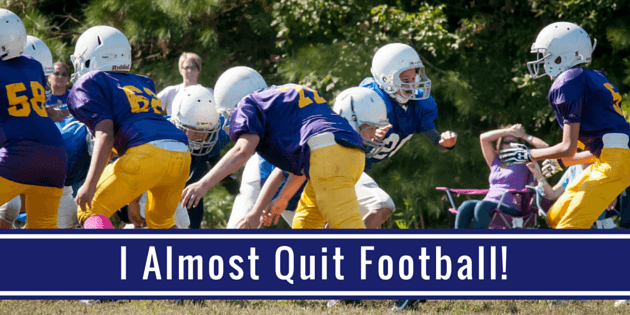
by Steve Stark | Jun 7, 2016 | youth football
In today’s post I want to share how I almost quit football.
I learned a very valuable lesson in my first year of organized football.
That lesson was, “Never quit because it’s too hard.”
I just read an article about how 70% of kids quit sports by the age of 13.
There are many reasons why kids quit but the big one is that they just aren’t having fun.
We need to understand why kids are quitting and above all else make sure they are having fun.
My hope is that you or someone you know might relate to this story.
Why I Almost Quit Football
When I was 9 years old I started playing tackle football for the Roscoe Lions.
I was so excited to play!
At that time, (and for the majority of my youth) I was, by far, the biggest kid in my class.
Everyone was ready for me to start playing football.
When I was 9, I had already played a couple years of basketball and baseball.
I was a pretty athletic kid for my size but I was a little overweight and a bit of a softy.
That year did not go like I had expected. Not even close…
As I look back on that first year of football, there were 3 things that nearly made me quit.
 1. Size isn’t everything in football.
1. Size isn’t everything in football.
With my size, even being somewhat athletic, I was much slower than most kids.
Because of the speed difference, the smaller kids hit harder and I did not like getting hit.
Football is hard. Especially for a young, big kid.
I quickly realized that football was much harder than baseball and basketball.
Wearing equipment and running in that equipment was not as fun as I thought it would be.
This seems to be a common theme for big kids in football (and other youth sports for that matter).
Big kids are often a little more awkward and they struggle to keep up with the conditioning.
While these big kids may be growing faster they are not often developing faster.
I am reminded of this all the time as I watch my 8-year-old who is already over 5 feet tall.
It’s like looking in a mirror.
He has no clue how to use that body… but he will.
It just takes time.
2. Managing everyone’s expectations.
Everyone thought I should be really good, including me.
I was huge. How could I not be good?
When it took me a while to get going I felt like I was letting people down.
I was disappointed in myself too.
It’s weird but I actually remember that feeling very clearly.
 3. I felt like a target.
3. I felt like a target.
Especially for the older, smaller kids. I was a big kid they could knock down.
And they knocked me down a lot.
It got to the point where I felt bullied.
That experience certainly toughened me up and helped me learn to stand up for myself.
Fortunately, before it got out of hand, I believe my coaches and my dad helped stop the bullying.
We are far more conscious of bullying today but it still happens and we must always be on the lookout for bullying.
Nothing deters a kid from an activity faster than bullying.
So the combination of these 3 things had me calling my dad at work nearly everyday before I had to go to football practice.
The conversation was always the same:
Me: “Dad, I don’t want to go to practice today. I don’t think I like football any more.”
Dad: “Why don’t you like it?”
Me: “I don’t know. It’s too hard.”
Dad: “Of course it’s hard. If it were easy everyone would do it.”
Me: “I want to quit football.” (crying)
Dad: “You begged me to sign you up this year. You have always loved football. If you quit football now, I am not going to sign you up again.”
Me: “It’s too hard.”
Dad: “Steve, once you start something, you finish it. You don’t quit. You don’t quit because something is too hard. You do the best you can but you never quit.”
And that was it. My dad didn’t let me quit football.
I have been extremely fortunate to have incredible parents.
My dad was a great athlete when he was younger but he never told me I had to play sports. It was always my choice.
He encouraged the heck out me.
He put up with crying and complaining.
He talked to the coaches and let them know that I was not having fun. (I believe he also had a hand in stopping the bullying.)
He ended up coaching and helping me get through that first year.
By the end of the season, I was starting to figure things out.
Football was fun again.
So often, this experience makes me think about how many kids don’t have an awesome dad like I do.
Would every dad have gone through the crying, the complaining, and the calls at work?
Would every dad step up, take time from work, and help coach so his son was more comfortable at practice?
I’d like to think so, but the truthfully the answer is no.
That’s why I feel so fortunate to have my dad.
What would have happened if my dad had let me quit?
No all-state honors as a senior.
No full-ride scholarship to the University of Wisconsin.
No Rose Bowl Championship.
No free-agent contract with the New York Jets.
Maybe… no coaching for almost 20 years so that I can help other big kids become better football players.
I learned a lesson that year that has served me throughout my life.
Never quit because it’s too hard.
I have used this with my own kids.
My oldest daughter begged me to swim competitively when she was 10 years old.
After the first week, she was crying and ready to quit. It was too hard.
The memories of my first year of football flooded back.
My dad’s voice was in my ear, “You don’t quit because it’s too hard.”
I told my daughter the same thing.
“You don’t quit because it’s too hard. You finish what you started. If you don’t want to do competitive swimming after this season you don’t have. But you can’t quit.”
After about 2 weeks she got used to the training and enjoyed it the rest of that season.
This is one of the greatest lessons of my life and I am so glad I now get to teach it to my own kids.
When your child asks to quit a sport you need to understand the real reason.
There are very few good reasons to quit football.
These are the questions I would find the answers to (and not just from your child but from coaches and other parents).
Questions to answer before you let your child quit football.
1. Are they being bullied?
This is the first question I would ask.
I would also be sure to speak to the coaches and other parents to make sure your child isn’t afraid to answer this question.
Bullying is intolerable.
A good coach will put a stop to it quickly.
2. Is the coach abusive?
Abuse comes in many forms.
From a coach, it often comes verbally.
Now I am not saying that a coach can never discipline a player.
But how that discipline is handled is extremely important.
I am big believer in “praise loudly, criticize softly”.
Youth football should be, first and foremost, about having fun.
3. Is your child in danger or hurting?
Is there a physical reason why your child is not having fun?
Asthma is big problem in a fall sport that’s outdoors.
Kids often have to deal with growing pains too.
My 8-year-old has them all the time.
Be sure to listen to your child’s complaints about pain.
Some may be soreness but if you’re not sure get them checked out by a physician.
These are all valid reasons for a child to quit football.
Maybe they just don’t like it. It’s not for everyone.
All I ask of my kids is that they try and they finish what they start.
Too hard is not a reason to quit football.
Overcoming “too hard” is how we learn.
Getting past “too hard” is how we get better.
Quitting can become a habit very quickly.
Be sure that your athlete understands that when something is hard… that’s the opportunity to really have fun.
That feeling of accomplishment is one of the greatest aspects of sports.
It will serve them forever. I know it has served me.
I hope you found some value with today’s post.
If you did please like, comment and share.
Play Big!

Coach Steve
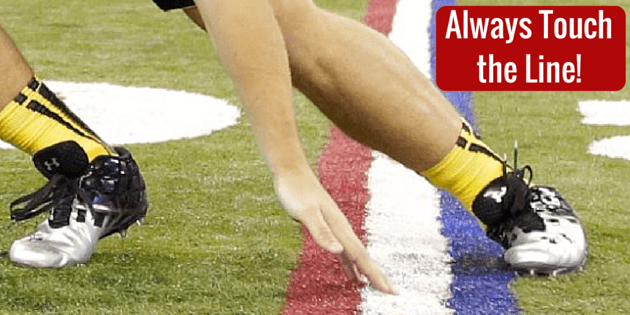
by Steve Stark | May 12, 2016 | Blog, coaching kids
It was a typical 7th-grade basketball practice at Stephen Mack Middle School in the winter of 1986.
At the end of practice, Coach Evans lined us up on the end line to run ladder sprints. (Ladders were the bane of our existence in 7th-grade basketball.)
I was a big kid and a little overweight so I really didn’t like sprints.
We were on the last leg of the sprint and Coach Evans blew the whistle for us to stop.
The team looked over to him as he was on the end line that we just touched.
Coach says, “We have to start over. Stark didn’t touch the line.”
Ughhhhh!!!
I had a tendency to go just short of the line in my sprints.
I just made the entire team start over with the one thing we all hated more than anything in the world.
What a lesson to learn!
From that day forward I was never “the guy” who made the rest of the team run because I didn’t touch the line.
What does it mean to “always touch the line”?
Why is that important?
What does it mean to “Always Touch the Line”?
1. You hold yourself accountable.
You can’t be a leader and you can’t hold others accountable if you aren’t first accountable to yourself.
Being part of a team is all about accountability but it starts with you.
You will only be as good as you decide to be.
Never cheat yourself.
Never cheat your team.
Decide to be great!
2. Others can depend on you.
No one person is ever greater than the team.
In football, like any other team sport, you need to depend on the person next to you.
You may think your teammates don’t see you stopping short of the line but they do.
You won’t ever reach your potential.
You won’t ever be as successful as you want to be.
You will never be a leader.
If you aren’t willing to give maximum effort in practice then your teammates and coaches won’t trust you when it counts.
3. You understand what it takes to succeed.
All of these things speak to what you are made of.
This is what decides whether or not you have integrity.
What is your integrity worth?
Everything!
This isn’t something kids are thinking about.
It’s a lesson we need to teach early on.
The earlier that our athletes learn about what it means to Always Touch the Line, the better their chance of success.
Not only in sports but in life.
Why is this lesson still important to me today?
Because it reminds me to always give everything I have to that which I am passionate about.
It reminds me that I can do anything with enough hard work.
It reminds me what it takes to be successful in everything that I do.
What will it remind you?
I hope you will always strive to “Always Touch the Line” in everything you do.
If you found value with this post please like, comment and share.
Also, if you have questions about training your athlete or your coaches please contact us at steve@trenchtraining.com or glenn@trenchtraining.com.
Let’s Play,

Coach Steve

![]() [/video_player]
[/video_player]









